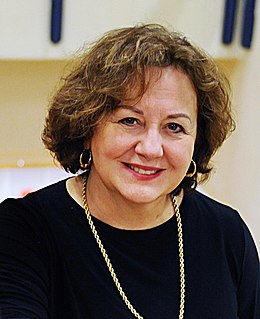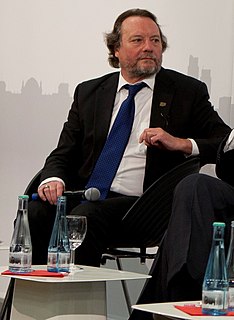
Paul Joseph DiMaggio (born January 10, 1951 in Philadelphia, Pennsylvania) [1] is an American educator, and professor of sociology at New York University since 2015. Previously, he was a professor of sociology at Princeton University.

Paul Joseph DiMaggio (born January 10, 1951 in Philadelphia, Pennsylvania) [1] is an American educator, and professor of sociology at New York University since 2015. Previously, he was a professor of sociology at Princeton University.
A graduate of Swarthmore College, DiMaggio earned his Ph.D. in sociology from Harvard in 1979. He was the executive director of Yale's program on nonprofit organizations (1982–87), and through 1991 he was a professor in the sociology department at the university. He was a fellow at the Center for Advanced Study in the Behavioral Sciences (1984–85) and at the John Simon Guggenheim Memorial Foundation (1990). He also served on the Connecticut Commission on the Arts and on the board of the National Assembly of State Arts Agencies. He was elected to the American Philosophical Society in 2016. [2]
DiMaggio's major works have been in the study of institutions and organizations and the formation of "high culture" in the U.S. His recent research explores social inequality in the Internet.
According to DiMaggio, belief systems and cultural frames are imposed on and adapted by individual actors and organisations. Thus, roles are for a large part determined by larger structures.
In a much-quoted article, DiMaggio and Walter W. Powell argued that organizations, whether corporate, governmental, or non-profit, adopt business practices not because they are efficient, but because they furnish legitimacy in the eyes of outside stakeholders, e. g. lenders, government regulators, and shareholders, as they need to maintain the confidence of these often poorly-informed outside parties. This makes them less creative and innovative in their practices, and leads to institutional isomorphism.
In his cultural studies, DiMaggio's historical research documented the self-conscious creation of "high culture" in the late 19th-century America. DiMaggio argues that, unsettled by the weak class distinctions in growing industrial cities, local elites created a "sophisticated" culture (via the arts, universities, social clubs, and the like) that would separate commoners from those of high standing. DiMaggio says that "high culture" models developed by founders of museums and orchestras were then adopted by patrons of opera, dance, and theatre.
DiMaggio's recent research considers the cultural advent of the Internet. He compares the emergence of the Internet with the rise of television in the 1950s. [3] Television was introduced to American consumers in 1948, and within ten years 90% of households had TV. In contrast, Internet diffusion (introduced on a large scale in 1994) seems to have stalled at approximately 60% of American households. DiMaggio believes that this difference is the result of the so-called digital divide - inequalities in Internet usage by race, income, and education level. DiMaggio maintains that these inequalities were not found in the adoption of TV in the 1950s, and suggests that differences in Internet usage among social groups will continue. This remains an open question, and some recent data suggest Internet usage is growing, with more than 70% of American adults reporting that they use the Internet. [4] [5] [6]
William Julius Wilson is an American sociologist. He is a professor at Harvard University and author of works on urban sociology, race and class issues. Laureate of the National Medal of Science, he served as the 80th President of the American Sociological Association, was a member of numerous national boards and commissions. He identified the importance of neighborhood effects and demonstrated how limited employment opportunities and weakened institutional resources exacerbated poverty within American inner-city neighborhoods.
New institutionalism is an approach to the study of institutions that focuses on the constraining and enabling effects of formal and informal rules on the behavior of individuals and groups. New institutionalism traditionally encompasses three strands: sociological institutionalism, rational choice institutionalism, and historical institutionalism. New institutionalism originated in work by sociologist John Meyer published in 1977.

Economic sociology is the study of the social cause and effect of various economic phenomena. The field can be broadly divided into a classical period and a contemporary one, known as "new economic sociology".
In the field of sociology, cultural capital comprises the social assets of a person that promote social mobility in a stratified society. Cultural capital functions as a social relation within an economy of practices, and includes the accumulated cultural knowledge that confers social status and power; thus cultural capital comprises the material and symbolic goods, without distinction, that society considers rare and worth seeking. There are three types of cultural capital: (i) embodied capital, (ii) objectified capital, and (iii) institutionalised capital.
In sociology, an isomorphism is a similarity of the processes or structure of one organization to those of another, be it the result of imitation or independent development under similar constraints. There are three main types of institutional isomorphism: normative, coercive and mimetic. The development that these three types of isomorphism can also create isomorphic paradoxes that hinder such development. Specifically, these isomorphic paradoxes are related to an organization's remit, resources, accountability, and professionalization.
In sociology and organizational studies, institutional theory is a theory on the deeper and more resilient aspects of social structure. It considers the processes by which structures, including schemes, rules, norms, and routines, become established as authoritative guidelines for social behavior. Different components of institutional theory explain how these elements are created, diffused, adopted, and adapted over space and time; and how they fall into decline and disuse.
Viviana A. Rotman Zelizer is an American sociologist and the Lloyd Cotsen '50 Professor of Sociology at Princeton University. She is a prominent economic sociologist who focuses on the attribution of cultural and moral meaning to the economy. A constant theme in her work is economic valuation of the sacred, as found in such contexts as life insurance settlements and economic transactions between sexual intimates. In 2006 she was elected to the PEN American Center and in 2007 she was elected to both the American Academy of Arts & Sciences and the American Philosophical Society.

The sociology of culture, and the related cultural sociology, concerns the systematic analysis of culture, usually understood as the ensemble of symbolic codes used by a member of a society, as it is manifested in the society. For Georg Simmel, culture referred to "the cultivation of individuals through the agency of external forms which have been objectified in the course of history". Culture in the sociological field is analyzed as the ways of thinking and describing, acting, and the material objects that together shape a group of people's way of life.
David Charles Stark is Arthur Lehman Professor of Sociology at Columbia University, where he served as chair of the sociology department and currently directs the Center on Organizational Innovation. He is also Professor of Social Science at the University of Warwick. He was formerly an External Faculty Member of the Santa Fe Institute. He is well-cited in the fields of economic sociology, social networks, science and technology studies, and social change and development.
Victor G. Nee is an American sociologist and professor at Cornell University, known for his work in economic sociology, inequality and immigration. He published a book with Richard Alba entitled Remaking the American Mainstream proposing a neo-assimilation theory to explain the assimilation of post-1965 immigrant minorities and the second generation. In 2012, he published Capitalism from Below co-authored with Sonja Opper examining the rise of economic institutions of capitalism in China. Nee is the Frank and Rosa Rhodes Professor, and Director of the Center for the Study of Economy and Society at Cornell University. Nee received the John Simon Guggenheim Fellowship in 2007, and has been a visiting fellow at the Russell Sage Foundation in New York ( 1994–1995), and the Center for Advanced Study in the Behavioral Sciences (1996-1997). He was awarded an honorary doctorate in Economics by Lund University in Sweden in 2013.
Institutional logic is a core concept in sociological theory and organizational studies, with growing interest in marketing theory. It focuses on how broader belief systems shape the cognition and behavior of actors.

Sociology is a social science that focuses on society, human social behavior, patterns of social relationships, social interaction, and aspects of culture associated with everyday life. It uses various methods of empirical investigation and critical analysis to develop a body of knowledge about social order and social change. While some sociologists conduct research that may be applied directly to social policy and welfare, others focus primarily on refining the theoretical understanding of social processes. Subject matter can range from micro-level analyses of society to macro-level analyses.

Michèle Lamont is a sociologist and is the Robert I. Goldman Professor of European Studies and a Professor of Sociology and African American Studies at Harvard University. She served as President of the American Sociological Association from 2016 to 2017. A recipient of the prestigious Erasmus award and other prestigious international awards, she has received honorary degrees from University of Ottawa, Université de Bordeaux and University of Amsterdam, University of Warwick, and University of Uppsala. She is married to sociologist Frank Dobbin and together they have three children.
Walter W. Powell, born August 15, 1951, is a contemporary American sociologist. Powell is Professor of Education, Sociology, Organizational Behavior, Management Science and Engineering, and Communication at Stanford University and the Stanford Graduate School of Education since 1999 and is known for his contributions to organizational theory, in particular to the new institutionalism and network theory. Since 2000, he has been an external faculty member of the Santa Fe Institute.

Helmut K. Anheier is a German-American academic. He is professor of sociology and past president of the Hertie School in Berlin. Until September 2019 he held a chair at the Max Weber Institute of Sociology, Heidelberg University, where he was also the Academic Director of the Center for Social Investment and Innovation. His research interests include civil society, social innovation, organizational theory, governance and policy research, social science methodology, including indicator models
Organizational field is defined as "sets of organizations that, in the aggregate, constitute a recognized area of institutional life; key suppliers, resource and product consumers, regulatory agencies, and other organizations that produce similar services or products".
Sociological institutionalism is a form of new institutionalism that concerns "the way in which institutions create meaning for individuals." Its explanations are constructivist in nature. According to Ronald L. Jepperson and John W. Meyer, Sociological institutionalism
treats the “actorhood” of modern individuals and organizations as itself constructed out of cultural materials – and treats contemporary institutional systems as working principally by creating and legitimating agentic actors with appropriate perspectives, motives, and agendas. The scholars who have developed this perspective have been less inclined to emphasize actors’ use of institutions and more inclined to envision institutional forces as producing and using actors. By focusing on the evolving construction and reconstruction of the actors of modern society, institutionalists can better explain the dramatic social changes of the contemporary period – why these changes cut across social contexts and functional settings, and why they often become worldwide in character.
The sociological theory of diffusion is the study of the diffusion of innovations throughout social groups and organizations. The topic has seen rapid growth since the 1990s, reflecting curiosity about the process of social change and "fueled by interest in institutional arguments and in network and dynamic analysis." The theory uses a case study of the growth of business computing to explain different mechanisms of diffusion.
Cognitive sociology is a sociological sub-discipline devoted to the study of the "conditions under which meaning is constituted through processes of reification." It does this by focusing on "the series of interpersonal processes that set up the conditions for phenomena to become “social objects,” which subsequently shape thinking and thought." Thus, this research aims to sort out the social and cultural contingencies and consequences of human cognition. It has its roots in classical sociological theory, notably Durkheim and Weber, and from contemporary sociological theory, notably Goffman and Bourdieu.
Arne Lindeman Kalleberg is a Kenan Distinguished Professor of Sociology at the University of North Carolina at Chapel Hill and a Faculty Fellow at the Carolina Population Center. He is also an adjunct professor in the Kenan-Flagler Business School, the Department of Public Policy, and the Curriculum in Global Studies. Kalleberg served as the secretary of the American Sociological Association from 2001 to 2004 and as its president from 2007 to 2008. He has been the editor-in-chief of Social Forces, an international journal of social research for over ten years.
{{cite web}}: External link in |work=| Wikiquote has quotations related to: Paul DiMaggio |